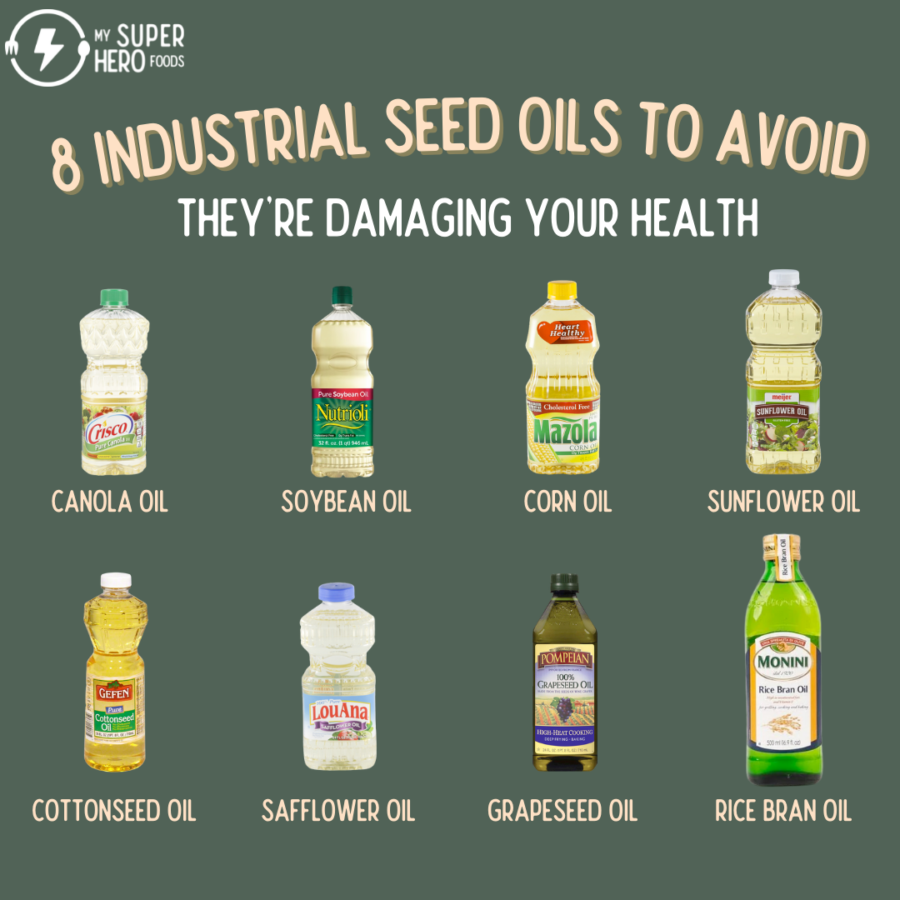Bye bye
Seed oils
Bye Bye
Seed Oils
ENROLL NOW!
don't miss out on a chance to help your family thrive!

Saying BYE BYE SEED OILS IN February
Chronic disease occurs for two main reasons: nutrient deficiency and toxicity. The hallmark of processed foods are nutrient deficiency and toxicity. Vegetable oils, in addition to refined sugar and flour, are the main ingredients of processed foods that have invaded and conquered our food supply. As a result, we are experiencing more chronic disease than ever before. Vegetable oils were non-existent in 1900 and now they represent up to a third of our food supply.
As the data continues to grow, it’s becoming clear how damaging seed oils are for our health. Seed oils are in nearly all processed foods you find in the grocery store today. Seed oils contain Omega-6 fatty acids which contain linoleic acid. While we do need a very small amount of omega-6 in our diet, we are consuming it excessively, mostly due to the fact that we eat too much processed food.
Linoleic acid is highly unstable. This means that with any processing or heating, it breaks down easily. When it breaks down, it creates toxic byproducts. These toxins are inflammatory and associated with heart disease, cancer, dementia, and many more health concerns.

Seed oils go through many levels of processing and heating, providing many opportunities for the linoleic acid to break down. The initial harsh processing includes extracting the oils from the seeds (usually with heat and pressure), dewaxing, washing with sodium hydroxide, filtering, bleaching, and deodorizing. After all that, it sits in a clear bottle on the grocery store shelf for months to years, where light can continue to oxidize (break down) the oil through the clear bottle. Then, when it is heated during cooking, the oil oxidizes some more. If the oil is used multiple times, a common practice in restaurants, it has even more opportunity to create those toxic byproducts.
It starts with an unstable oil which is processed, exposed to light, and heated, and it ends with an incredibly inflammatory substance that we are regularly consuming.
Seed oils are linked to whole body inflammation, metabolic dysfunction, diabetes, fatigue, hormone disruption, autoimmune disease, heart disease, and cancer. However, they are prevalent across the food industry, widely used in restaurants, and littered across grocery shelves by the thousand.
Why aren’t more people talking about this? Why are there so many conflicting headlines? How can corn oil be heart healthy and dangerous for your heart at the same time? Well, we’re here to help sort through the clutter, misinformation, and help you understand why seed oils are dangerous for our families and what we should be choosing instead.
Hopefully, we’ve caught your attention, so let’s jump in!
WHAT ARE SEED OILS?
Seed oils—aka industrial seed oils or vegetable oils—are extracted from the seed of a plant. Examples include sunflower, corn, cottonseed, soy, canola, grapeseed, sunflower, safflower, peanut and rice bran. These oils are highly processed, including using chemical solvents, extreme heat and mechanical pressure. This processing causes the fatty acids to oxidize, which creates byproducts that are harmful to our health.
Industrial seed oils are hidden in many, if not most, processed foods like cookies, salad dressing, crackers, chips, candy, vegetable puffs, granola bars, and even nut milks. These oils are much cheaper than other types of healthier fats which make them an easy choice for food manufacturers trying to make a profit.
Seed oils are also widely used in restaurants for the same reason: they are inexpensive and abundant.

How are seed oils made?
The bottle of canola oil says “heart healthy.” That must be true, right? Well, this claim is based on the fact that vegetable oils have been shown to reduce cholesterol. But, it doesn’t take into account the many other effects of the inflammation that these oils produce in the body. All those other effects far outstrip the potential reduction in cholesterol levels. Also, cholesterol has been unfairly demonized. It’s still important for our hormones, brain healthy, and the integrity of our cell membranes.
We often say: it’s not always what’s in the food, but what has been done to the food. Most seed oils today are highly refined and once they’re made, they don’t resemble vegetables at all.

Let’s look at the example of canola oil.

The oil is extracted from canola plant seeds that have often been heavily sprayed with glyphosate (the active ingredient in RoundUP) through either a chemical solvent or oil mill.

They wash the oil for 20 minutes in sodium hydroxide (the same inorganic compound that is often found in commercial drain and oven cleaners) to clarify the oil.

The oil is still cloudy, so it goes through another process that helps to remove the wax (which they save to use for vegetable shortening).

After washing and filtering the oil, it is bleached to lighten the color and processed even more with steam and a deodorizer to remove the odor.

By the time the finished product is ready, it has been so processed and changed that it’s more similar to gasoline than a canola plant.
Wow!!
When you read through that process, it isn’t a surprise that studies have indicated that regular consumption of seed oils have a higher mortality rate than those who use healthier cooking fats.

Get FREE access to our
#superheroyou PROGRAM!
There’s no time like today. And there’s nothing like building a community of SuperHero friends to help us stick to our goals. Have a chance to earn prizes while learning new tips and tricks to help you and your family thrive ALL year.
FAQ on Seed Oils
There are so many questions about seed oils, so we’ve put together a list of the most common questions on seed oils. Want to learn more? Check out our new e-book, The Ultimate Guide to Avoiding Seed Oils in Your Kitchen. Have another question you think we should add? Send us a message!
When did we start making and eating seed oils?
Seed oils (with the exception of olive, palm, coconut, and sesame oil) were nonexistent throughout our history until very recently.
The progression of seed oils was well captured in an issue of Popular Science in 1894 describing cottonseed oil: “What was garbage in 1860, was fertilizer in 1870, cattle feed in 1880, and table food and many [other] things in 1890.”
Seed oils didn’t even start as food. In 1866, cottonseed oil was commercially extracted NOT for food but for MACHINE Lubricant, soap, and LAMP OIL largely replacing whale fat. No one suggested putting cottonseed oil in our bodies, but it found its way into fertilizer and then feed for cattle. Unethical business people stood to reason that if it didn’t kill our cattle, it probably wouldn’t kill us, so into our kitchens it went.
The key company that began the scientific experiment without our informed consent was Procter and Gamble. They introduced Crisco, which used cottonseed oil, as the first major introduction of seed oil into our diets in 1909. Animal fats such as lard, butter, tallow were 99% of all additional fat to our diet before 1909! There has been no evolutionary precedence for using seed oils throughout our entire human history. However, by 2005, 86% of all added fat in the American diet were from seed oils.
How much seed oil is the typical American eating?
From 1900 to the present: the largest increase in our food consumption is seed oils! We went from 0 grams of vegetable oil consumption around 1900 to 80 grams/day in 2020.
The average American today is consuming up to 32% (over 700 calories) of their total calories from vegetable (seed) oils which is a whopping 150-fold increase! Most people aren’t aware of how much seed oil is in their diet because it is hidden in prepared and processed foods.
How are seed oils harmful?
Industrial seed oils are strongly linked to whole body inflammation, metabolic disorder, diabetes, heart disease, autoimmune disorders, Alzheimer’s and other neurodegenerative diseases, and even cancer!
Seed oils are primarily Omega-6 fatty acids. There are several omega-6 fatty acid molecules but the most common and important fatty acid is Linoleic acid. Briefly, it is the breakdown (oxidation) products of linoleic acid (and the amount) that causes inflammation which leads to all sorts of problems in the human body (more to come down below). Excess inflammation is the root of most chronic disease.
Seed oils are also replacing more nutrient-dense fats. Because they are heavily processed, most of the nutrients that were available in the whole plant are stripped out by the time the oil is on the shelf. Once a seed oil is oxidized, most of the nutritional value is lost. So, instead of benefiting from vitamin-rich, mineral-rich fats like grass fed tallow and butter which provide clean energy and support our bodily systems, we are consuming empty calories that promote inflammation and free radicals in our systems.
And the list of reasons to avoid seed oils goes on.
What is an example of a toxic byproduct that is produced when seed oils break down or oxidize?
HNE is the most abundant cytotoxic (cell-killing) byproduct produced as the linoleic acid (omega-6) in seed oils oxidizes. Omega-6 and its breakdown products accumulate in our fat cells. In short, it causes the fat cells to grow larger, break down and fail at their job as important endocrine (signaling) organs. This leads to obesity and other chronic diseases.
HNE, known as the most toxic aldehyde, is extremely reactive and has been implicated as an important step in the formation of most chronic diseases and even cancer. It has been linked with obesity, premature aging, cancer, general inflammation, heart disease, metabolic dysfunction, diabetes, strokes, Alzheimers and others. It is like a free radical that wrecks havoc in the body. It can be measured in the blood, as it is now recognized as a stress marker.
What about organic seed oils?
At the end of the day, regardless if the oil is organic or not, it still goes through intense processing and contains the same amount of linoleic acid. Linoleic acid is inflammatory and therefore consuming organic seed oils doesn’t offer any advantages from an inflammatory perspective. We recommend avoiding all seed oils when possible, even organic.
What type of oils do restaurants use?
Because seed oils are so cheap, they are the cooking oil of choice for most restaurants. Soy and canola are very popular in restaurants, especially ones that require large volumes of oil and frequent oil changes. (Think french fries! Or anything else deep fried.) Side note, Malcolm Gladwell has a very interesting story about why McDonald’s shifted from beef tallow to canola oil. It had to do with the misplaced fears that arose in the 70s about how fats lead to heart disease.
Unfortunately, nearly all restaurants use seed oils, so if you’re eating out, it’s hard to avoid them. It’s not very practical to swear off eating out ever again, so we recommend trying to cook at home when you can and when you eat out avoiding foods that require the most amount of oil to cook (like fried foods). You can always ask a restaurant what cooking oils they use–every once in a while you’ll find a place that still uses tallow for their french fries!
Another thing to look out for is the “olive oil” that sits on the table in a restaurant. There is a good chance that it is mixed with other oils. (Not to mention, it is usually oxidized and rancid.) I often bring a small bottle of fresh olive oil from home in my purse and dress my salad with that.
What about margarine and butter substitutes?
We recommend you avoid these. Have you ever read the ingredients in margarine? Often, the first ingredient is a seed oil. These seed oils are hydrogenated to make them solid at room temperature. Margarine and butter substitutes also likely contain artificial ingredients and other low quality, highly processed ingredients.
Healthier Oils to Replace Seed Oils
The best alternative to seed oils are saturated fats from healthy animals. Examples of saturated fats include grass fed tallow, grass fed butter, grass fed ghee, and organic coconut oil. Saturated fats are healthy despite what much of the misguided science promotes. Saturated fats provide us with vitamins (A, D, E, K2) not found in other oils. They also contain stearic acid which our mitochondria (energy factories in our cells) love to burn for clean energy. We love cooking with saturated fats!
Other oils to consider are organic, extra virgin olive oil and organic, extra virgin or unrefined avocado oil. Good quality extra virgin olive oil and unrefined avocado oil contain healthy monounsaturated fats that are also an ideal source for energy. We like to use extra virgin olive oil raw in dressings, pestos, and as a topping but you can use it to cook at low temperatures as well. In our house, we don’t often use unrefined avocado oil, but it is also fine for cooking at low to medium temperature or using raw.
Avocado oil and olive oil both contain a small amount of linoleic acid, around 10-15%. This is why we prefer to mostly cook with animal fat/saturated fat.
Sadly, most of the olive oils and avocado oils found in the stores today are not 100%. In one study, 87% of the avocado oil tested was either mixed with some sort of seed oil OR was 100% a seed oil with no avocado oil in it. Yes, you read that correctly, and it’s nothing new. In 1880, up to 40% of olive oil made in the US (California) was mixed with cottonseed oil.
Additionally, refined avocado oil and olive oil are highly processed and stripped of their nutrients.



Want to learn more?
Check out our eBook, My SuperHero Foods Ultimate Guide to Avoiding Seed Oils in Your Kitchen for more information on how to swap seed oils for healthy fats at home. We break down each of our favorite cooking fats and the best applications for each. We also go into cost-saving tips, our trusted brands, and the best way to store your cooking fats to keep them fresh for longer. We also include a list of references and further reading if you are wanting to learn more about the harms of seed oils and the benefits of ancestral fats! Plus, it includes a super practical cheat sheet you can post on your fridge for a quick reference when you need it most.
So I should still be consuming fats and oils,
I just need to choose the right ones?
Yes, yes, and a bigger yes! Healthy fats are incredibly healthy and amazing for the body, brain, heart, and skin. Make a habit of finding daily ways to include the healthy fats above into your diet, choose the right healthy fats and oils for the specific cooking applications, and avoid seed oils as best as you can.

#Byebyeseedoil challenges:
Use #SuperHeroYOU2023 AND tag @mysuperherofoods on instagram posts and stories
Cut seed oils from your family’s diet for one month!
- Sauteing with canola oil? Grab a jar of tallow or ghee instead!
- Baking with vegetable oil? Swap it out for grass fed butter. I bet you’ll like the taste better too 😉
- Using salad dressing with soybean oil? Make your own in just a few minutes.
- Buying cookies from the store? We’ve got a great chocolate chip cookie recipe you can try.
- In general, try switching to making your own or swapping a whole food for a processed one.
Do your best!
Even small changes can add up over time. Our family has been nearly seed oil free for a couple of years. Follow along on Instagram for tips on how we’ve gone seed oil free.
Articles Related to #ByeByeSeedOils

6 Reasons to Ditch Ultra Processed Food from Kids’ Diets
As our lives have become busier and more hectic, we’ve become increasingly reliant on ultra processed foods for ourselves and our children. Unfortunately, the convenience

Is Sunflower Oil Healthy? Why Sunflower Seeds are Healthy and Sunflower Oil Isn’t
Sunflower seeds are awesome! Seeds and nuts contain many vitamins and minerals that our bodies need. Sunflower seeds have many other benefits too including boosting

13 Easy Seed Oil Free Snacks for Kids
Easy, quick snacks are a necessity for every parent. Hungry kids are not happy kids! But so many of the processed snacks available in the

Do Seed Oils Make You Sick? Why Some Doctors Say Seed Oils are Heart Healthy When They’re Not
Seed oils are ultra processed and pro-inflammatory foods that are linked to heart disease and other chronic conditions. The science is becoming clearer every day,

Sesame Oil is a Seed Oil: But is It Bad for You?
Seed oils are a group of inflammatory seed oils that are linked to inflammation and other health conditions. They are in all kinds of pastries,

8 Reasons to Avoid Seed Oils
We believe that cutting industrial seed oils from your diet may be one of the most important steps you can take to improve your health.
Resource Guides
Take a closer look at our Nutrition & ingredients section

Get FREE access to our
#superheroyou PROGRAM!
There’s no time like today. And there’s nothing like building a community of SuperHero friends to help us stick to our goals. Have a chance to earn prizes while learning new tips and tricks to help you and your family thrive ALL year.







